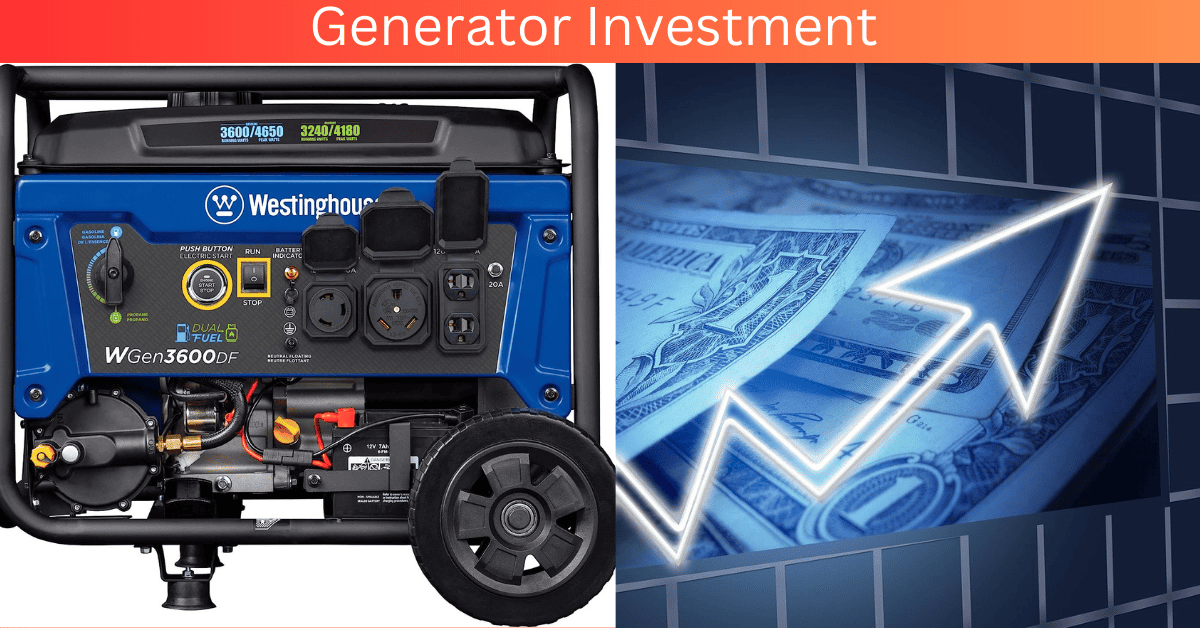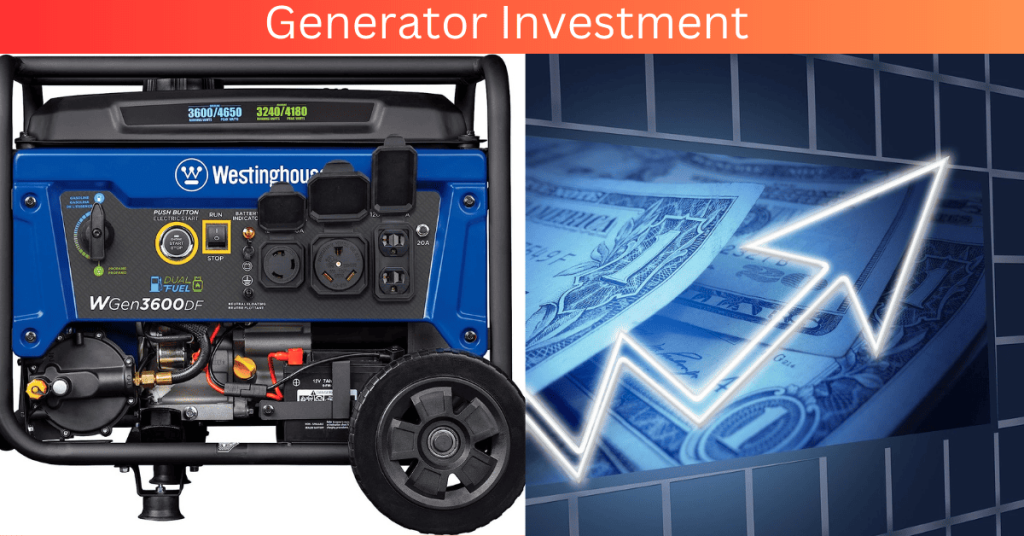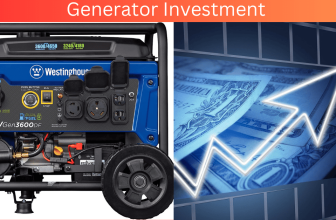Power Spending: Unraveling Portable Generator Investments

As we become more reliant on technology and electricity in our daily lives, the need for a reliable power source becomes increasingly important. Whether you’re camping in the wilderness, living off the grid, or experiencing a power outage, a portable generator can be a lifesaver. But with so many options on the market, it can be overwhelming to choose the right one.
That’s why in this article, we’ll be unraveling the complexities of portable generator investments and helping you make an informed decision.
Understanding your power needs is the first step in choosing the right portable generator. Do you need to power a few small appliances or an entire home? Will you be using it for occasional or frequent use? These are important factors to consider when selecting the right generator for your needs.
We’ll also explore the various fuel types available, assess runtime and fuel efficiency, consider noise level and emissions, evaluate portability and convenience, and compare features and accessories. By the end of this article, you’ll have a comprehensive understanding of portable generators and be equipped to make a confident investment decision.
Key Takeaways
- Reliable power sources are becoming increasingly important as our reliance on technology and electricity grows.
- When choosing a portable generator, it’s crucial to consider factors such as power needs, fuel type, runtime, fuel efficiency, noise level, and emissions.
- Features and accessories such as portability, RV outlets, multiple AC outlets, automatic voltage regulation, and maintenance kits can enhance the portable generator experience.
- It’s important to do thorough research and compare options before making an investment decision, considering factors such as power output, intended use, wattage, and fuel efficiency.

Understanding Your Power Needs
You’ll need to figure out how much power you actually need before investing in a portable generator. This is important because you don’t want to overspend on a generator that can provide more power than you require. Conversely, you don’t want to invest in a generator that cannot meet your power needs during an emergency.
To determine your power requirements, you should first make a list of the electrical items that you want to power during a power outage. This could include appliances like refrigerators, freezers, and air conditioning units, as well as electronics like phones, laptops, and televisions. You should also check the power ratings of each of these items, which will give you an idea of how much power they require to operate.
Once you have a list of the items you want to power and their power ratings, you can add up the total power consumption to determine the minimum power rating you need for your portable generator. This will ensure that you invest in a generator that can meet your power needs during an emergency.
After determining your power requirements, you can move on to choosing the right fuel type for your generator.
Choosing the Right Fuel Type
It’s important to consider the fuel type when selecting a portable generator. Not all fuels are created equal, and each has its own set of advantages and disadvantages. Here are four key factors to keep in mind when choosing the right fuel type for your portable generator:
- Availability: Make sure that the fuel you choose is readily available in your area. There’s no point in investing in a generator that runs on a fuel you can’t easily access.
- Cost: Different fuel types have different costs associated with them. Consider both the initial cost of the fuel and the ongoing cost of refueling your generator.
- Shelf life: Some fuel types have a longer shelf life than others. If you don’t plan on using your generator frequently, you may want to choose a fuel that won’t go bad if it sits unused for extended periods of time.
- Environmental impact: Finally, consider the environmental impact of the fuel you choose. Some fuels are cleaner burning than others and produce fewer emissions.
When it comes to selecting the right fuel type for your portable generator, there’s no one-size-fits-all answer. It depends on your specific needs and circumstances. However, by keeping these four factors in mind, you’ll be able to make an informed decision that will help you get the most out of your generator.
Assessing runtime and fuel efficiency is the next step in finding the perfect portable generator for your needs.
Assessing Runtime and Fuel Efficiency
Now, let’s take a closer look at how long your generator will run and how efficient it is with fuel. These are two crucial factors to consider when evaluating the performance of a portable generator.
Runtime refers to the amount of time your generator can operate on a single tank of fuel. It is crucial to assess runtime as it determines how long you can use your generator without the need for a fuel refill.
Fuel efficiency, on the other hand, refers to how much fuel your generator consumes to produce a given amount of power. The more fuel-efficient your generator is, the less fuel it will consume, translating to significant fuel savings in the long run. Therefore, it’s crucial to choose a generator that is both fuel-efficient and has an extended runtime. This way, you can enjoy uninterrupted power supply without worrying about frequent refueling or high fuel costs.
Considering noise level and emissions is the next step in choosing the right portable generator. It’s essential to opt for a generator that produces minimal noise and emissions. Noise can be a nuisance, especially if you plan to use your generator in a residential area. Similarly, emissions can harm the environment and pose health risks, making it crucial to choose a generator that complies with environmental regulations.
Considering Noise Level and Emissions
Let’s talk about the importance of considering the noise level and emissions of a portable generator.
When evaluating a generator, it’s crucial to understand decibel ratings. This measurement tells us how loud the machine is.
Additionally, we need to look at the emissions levels. It’s important to ensure that the generator complies with local regulations. This helps reduce our impact on the environment.
Understanding Decibel Ratings
Understanding decibel ratings is crucial when choosing a portable generator, as a difference of just a few decibels can result in a significant change in noise level. Decibels (dB) are used to measure the intensity of sound, and the scale is logarithmic, meaning that a 10 dB increase actually represents a 10-fold increase in sound intensity. This means that a generator that produces 70 dB of noise is actually 10 times louder than one that produces 60 dB.
When evaluating decibel ratings, it’s important to note that even a small increase in decibels can have a big impact on noise level. Therefore, it’s best to choose a generator with the lowest decibel rating possible.
While understanding decibel ratings is important, it’s not the only factor to consider when choosing a portable generator. In addition to noise level, evaluating emissions levels is also crucial. Excessive emissions can not only damage the environment, but can also be harmful to human health.
Therefore, it’s important to choose a generator that meets EPA emissions standards. By considering both decibel ratings and emissions levels, you can find a portable generator that not only performs well but is also environmentally responsible.
Evaluating Emissions Levels
Considering emissions levels is crucial when selecting a generator to ensure it’s efficient and environmentally conscious. Here are four items to consider when evaluating emissions levels:
- EPA Certification: Look for generators certified by the Environmental Protection Agency (EPA). EPA certification ensures the generator meets emission standards set by the agency.
- CARB Compliance: If you live in California or any other state following the California Air Resources Board (CARB) standards, make sure the generator is CARB compliant. CARB sets strict emissions standards, and non-compliant generators cannot be sold or operated in the state.
- Type of Fuel: The type of fuel the generator uses plays a role in its emissions levels. Diesel generators emit more pollutants than gas generators. Natural gas generators produce lower emissions and are more environmentally friendly.
- Emissions Data: Look for generators providing emissions data. This can give you an idea of how much pollution the generator produces and how it compares to other models.
When evaluating emissions levels, keep in mind that compliance with local regulations is also a crucial factor. Local regulations may be more stringent than federal regulations, and failure to comply can result in fines or other penalties. By selecting a generator meeting both federal and local regulations, you can ensure you’re not only protecting the environment but also complying with the law.
Compliance with Local Regulations
Now that we’ve evaluated the emissions levels of potential portable generators, it’s important to consider compliance with local regulations. Different regions have different regulations when it comes to emissions and noise levels, and it’s crucial to ensure that any generator we invest in meets these requirements. Failure to comply with local regulations can result in fines and legal issues, which can end up costing us more in the long run.
To help us navigate this complex issue, we’ve created a table with information on the regulations in different regions. This table outlines the maximum decibel level allowed, as well as any emissions standards that need to be met. By referring to this table, we can easily determine whether a particular generator meets the regulations in our area, or if we need to look for a different option. This will save us time and money in the long run, and help us avoid any legal issues.
Now that we’ve considered emissions levels and compliance with local regulations, it’s time to evaluate the portability and convenience of potential portable generators. This is an important aspect to consider, as we want to ensure that we can easily transport and use the generator when and where we need it.
Evaluating Portability and Convenience
You’ll feel like a nomad roaming free with a portable generator that can easily be carried on your back, allowing you to power up wherever and whenever you want. Portability and convenience are key factors to consider when evaluating a portable generator investment.
A lightweight and compact design is ideal, especially if you’re planning to move around frequently. Aside from the weight and size, the generator’s mobility features should also be assessed. Some models come with wheels and handles for easier transportation, while others have built-in lifting handles for effortless carrying.
Make sure to choose a generator that fits your needs and lifestyle, as this can greatly affect the generator’s functionality and overall user experience. In the next section, we will be comparing features and accessories to help you further evaluate your portable generator investment. But first, it’s important to consider the generator’s portability and convenience.
Remember, a generator that’s easy to carry and transport will be more beneficial in the long run.
Comparing Features and Accessories
Get ready to compare features and accessories that can enhance your portable generator experience! When looking for a portable generator, it’s important to consider what features and accessories are included.
Some generators come equipped with RV outlets, multiple AC outlets, and USB ports for charging devices. Others may have automatic voltage regulation to ensure a steady flow of power. It’s important to evaluate what features are necessary for your specific needs and preferences.
Accessories can also enhance your generator experience. For example, a wheel kit can make it easier to transport your generator, while a cover can protect it from the elements. Other accessories may include extension cords, fuel stabilizer, and a maintenance kit.
While some accessories may be included with the generator, others may need to be purchased separately. By comparing different features and accessories, you can make an informed investment decision that will provide the best value for your money.
Keep in mind factors such as the generator’s intended use, wattage, and fuel efficiency when making your decision. With the right features and accessories, your portable generator can provide reliable power in any situation.
Making an Informed Investment Decision
When it comes to making an investment decision on a portable generator, it’s important to do your research. You want to make sure that you’re making an informed decision and getting the best value for your money. Don’t rush into a purchase without weighing all of your options carefully.
Take the time to read reviews and compare features to make sure you’re making the right choice. One important factor to consider when purchasing a portable generator is the power output. You need to make sure that the generator you choose can handle the wattage needed for your specific needs.
If you plan on using it for camping or outdoor events, a lower wattage output may suffice. However, if you plan on using it for emergency power during a blackout, you’ll want to make sure you choose a generator with a higher wattage output. Another factor to consider is the fuel source.
Portable generators can run on gasoline, propane, or diesel. Each fuel source has its own pros and cons, so it’s important to weigh these carefully before making a decision. For example, gasoline is widely available, but it can also be dangerous to store and transport.
Propane is a cleaner-burning fuel, but it requires special equipment to store and transport. Diesel is a reliable fuel source, but it can be more expensive than gasoline. By weighing these options, you can make an informed decision on which fuel source is right for you.
Frequently Asked Questions
Can I use a portable generator indoors?
Yes, we can use a portable generator indoors, but safety should be our top priority. Make sure to place it in a well-ventilated area, away from combustible materials, and use a carbon monoxide detector to avoid the risk of poisoning.
How often should I perform maintenance on my portable generator?
Maintaining a portable generator is like keeping a car running smoothly. We perform routine maintenance every 6 months, or after 50 hours of use. Neglecting maintenance can lead to costly repairs and even endanger our safety.
Is it safe to connect my portable generator directly to my home’s electrical system?
No, it’s not safe to connect a portable generator directly to a home’s electrical system. Doing so can cause electrical fires and harm to people. Always use a transfer switch to connect a generator to your home.
Can I run my portable generator continuously without any breaks?
We shouldn’t run our portable generator continuously without breaks. Doing so can lead to overheating and damage the generator. It’s best to give it some rest every few hours to ensure its longevity and optimal performance.
What should I do if my portable generator fails to start?
If our portable generator fails to start, we first check the oil level, fuel supply, and spark plug. If these are okay, we call a professional. Regular maintenance reduces the likelihood of failure.
Conclusion
Overall, investing in a portable generator can provide peace of mind and convenience during power outages or outdoor activities. However, it’s important to carefully consider various factors before making a decision.
According to a recent study, the global portable generator market is projected to reach a value of $2.5 billion by 2026, with a compound annual growth rate of 5.2%. This highlights the increasing demand for portable generators as a reliable source of backup power.
As consumers continue to prioritize preparedness and convenience, it’s crucial to thoroughly evaluate different models and features to ensure a worthwhile investment. By taking the time to understand power needs, fuel type, runtime, noise level, emissions, portability, and additional features, individuals can make an informed decision and confidently purchase a portable generator that meets their specific needs.





